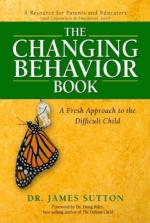Feel Invisible? Try This! (Dr. Tom Phelan)
 Dr. Phelan: Much too often, I feel that nothing I do or say to my children is making the slightest bit of difference. It’s like I’m invisible in my own home. Any thoughts?
Dr. Phelan: Much too often, I feel that nothing I do or say to my children is making the slightest bit of difference. It’s like I’m invisible in my own home. Any thoughts?
…………….
 If you’re a parent living with small children, you may often feel like you’re invisible to your kids. After spending a day cajoling, reasoning, threatening and even screaming in an attempt to get your kids to behave, you may feel as if they never listen to you, much less respond.
If you’re a parent living with small children, you may often feel like you’re invisible to your kids. After spending a day cajoling, reasoning, threatening and even screaming in an attempt to get your kids to behave, you may feel as if they never listen to you, much less respond.
But all that talking is precisely the problem. If you feel like you’re invisible, you’re probably way to audible. When it comes to discipline, silence often speaks louder than words.
One Problem: An “Extra” Goal
Many parents complicate the job of discipline by setting for themselves two goals instead of just one. Their first goal is to get the kids to do what they’re supposed to do, which is fine. But when kids don’t respond right away, many parents add a second goal: getting the youngsters to accept, agree with, or even like the discipline. So Mom and Dad start reasoning, lecturing and explaining.
One Explanation Should Suffice
All this extra talking accomplishes only two things, and both of them are bad. First, it aggravates the kids, and second, it says to the children that they really don’t have to behave unless you can give them four or five reasons why they should.
One explanation is fine. But the mistake many parents make is trying to reason with their kids as if they were “little adults,” and too often adult logic does not impress or motivate young children. Once you say “No” to obnoxious behavior, you should save your breath. Further pleading will irritate you more and give the child a chance to continue the battle … and the behavior.###
Dr. Tom Phelan is an internationally recognized child and adolescent psychologist. He is the author of the aclaimed bestseller, 1-2-3 Magic! His website is www.parentmagic.com.
Share this:
- Click to email a link to a friend (Opens in new window)
- Click to print (Opens in new window)
- Click to share on Facebook (Opens in new window)
- Click to share on LinkedIn (Opens in new window)
- Click to share on Twitter (Opens in new window)
- Click to share on Tumblr (Opens in new window)
- Click to share on Pinterest (Opens in new window)
February 4, 2018 Posted by docspeak | Affirmation and Recognition, Communication, Difficult Child, Discipline, Educators, family, Healthy living, Parents, Resilience | bribing children to behave, cajoling children to behave, compliant behavior 1-2-3 Magic!, Dr. Thomas Phelan, Dr. Tom Phelan, feeling invisible, feeling invisible as a parent, gaining compliance, good parenting, Thomas Phelan, Tom Phelan, trying to reason with children about behavior | Leave a comment
Feeling Invisible? Try This! (Dr. Tom Phelan)
 Dr. Phelan: Much too often, I feel that nothing I do or say to my children is making the slightest bit of difference. It’s like I’m invisible in my own home. Any thoughts?
Dr. Phelan: Much too often, I feel that nothing I do or say to my children is making the slightest bit of difference. It’s like I’m invisible in my own home. Any thoughts?
…………….
 If you’re a parent living with small children, you may often feel like you’re invisible to your kids. After spending a day cajoling, reasoning, threatening and even screaming in an attempt to get your kids to behave, you may feel as if they never listen to you, much less respond.
If you’re a parent living with small children, you may often feel like you’re invisible to your kids. After spending a day cajoling, reasoning, threatening and even screaming in an attempt to get your kids to behave, you may feel as if they never listen to you, much less respond.
But all that talking is precisely the problem. If you feel like you’re invisible, you’re probably way to audible. When it comes to discipline, silence often speaks louder than words.
One Problem: An “Extra” Goal
Many parents complicate the job of discipline by setting for themselves two goals instead of just one. Their first goal is to get the kids to do what they’re supposed to do, which is fine. But when kids don’t respond right away, many parents add a second goal: getting the youngsters to accept, agree with, or even like the discipline. So Mom and Dad start reasoning, lecturing and explaining.
One Explanation Should Suffice
All this extra talking accomplishes only two things, and both of them are bad. First, it aggravates the kids, and second, it says to the children that they really don’t have to behave unless you can give them four or five reasons why they should.
One explanation is fine. But the mistake many parents make is trying to reason with their kids as if they were “little adults,” and too often adult logic does not impress or motivate young children. Once you say “No” to obnoxious behavior, you should save your breath. Further pleading will irritate you more and give the child a chance to continue the battle … and the behavior.###
Dr. Tom Phelan is an internationally recognized child and adolescent psychologist. He is the author of the aclaimed bestseller, 1-2-3 Magic! His website is www.parentmagic.com.
Share this:
- Click to email a link to a friend (Opens in new window)
- Click to print (Opens in new window)
- Click to share on Facebook (Opens in new window)
- Click to share on LinkedIn (Opens in new window)
- Click to share on Twitter (Opens in new window)
- Click to share on Tumblr (Opens in new window)
- Click to share on Pinterest (Opens in new window)
July 7, 2016 Posted by docspeak | Difficult Child, family, Healthy living, Parents, Resilience | bribing children to behave, cajoling children to behave, compliant behavior 1-2-3 Magic!, Dr. Thomas Phelan, Dr. Tom Phelan, feeling invisible, feeling invisible as a parent, gaining compliance, good parenting, Thomas Phelan, Tom Phelan, trying to reason with children about behavior | Leave a comment
About This Site
 This blog, It’s About Them, was founded in 2006 by child and adolescent psychologist, Dr. James Sutton. Content will vary, but the message here promotes courage, kindness, vision and the powers of the human spirit in ourselves and our children. Dr. Sutton can be reached at james78064@yahoo.com.
This blog, It’s About Them, was founded in 2006 by child and adolescent psychologist, Dr. James Sutton. Content will vary, but the message here promotes courage, kindness, vision and the powers of the human spirit in ourselves and our children. Dr. Sutton can be reached at james78064@yahoo.com.
Since Dr. Sutton is now mostly retired, this website is also the primary contact for Friendly Oaks Publications, founded and operated by Dr. Sutton for 30 years. The email address of the publishing company is friendlyoakspublications@yahoo.com.
………………………
Books by Dr. James Sutton
Below are the covers of some of the books written by Dr. Sutton and published by Friendly Oaks Publications. Paperback books are listed on the left; e-books on the right. Contact Dr. Sutton at either of the email addresses above for more information regarding any of these publications.
BOOKS






Categories
- ADHD
- adversity
- Affirmation and Recognition
- anger
- Anxiety and Depression
- Communication
- Compassion
- confidence
- Counselors
- courage
- Difficult Child
- Discipline
- Divorce Issues
- Educators
- family
- Healthy living
- Human Interest
- Humor
- Inspirational
- Integrity
- Law & Justice
- Links
- Parents
- patriotism
- Resilience
- Self-esteem
- Sleep Issues
- Special Occasions
- Stress
- Success Strategies
- Uncategorized
- veterans
 Suscribe to this Blog
Suscribe to this Blog- An error has occurred; the feed is probably down. Try again later.
E-BOOKS






Archives
- July 2022
- December 2021
- September 2021
- August 2021
- April 2021
- February 2021
- January 2021
- December 2020
- September 2020
- August 2020
- June 2020
- May 2020
- April 2020
- February 2020
- December 2019
- October 2019
- September 2019
- August 2019
- July 2019
- June 2019
- April 2019
- March 2019
- February 2019
- January 2019
- November 2018
- October 2018
- September 2018
- August 2018
- July 2018
- June 2018
- May 2018
- April 2018
- March 2018
- February 2018
- January 2018
- December 2017
- November 2017
- October 2017
- September 2017
- August 2017
- July 2017
- June 2017
- May 2017
- April 2017
- March 2017
- February 2017
- January 2017
- December 2016
- November 2016
- October 2016
- September 2016
- August 2016
- July 2016
- June 2016
- May 2016
- April 2016
- March 2016
- February 2016
- January 2016
- November 2014
- October 2014
- August 2014
- April 2014
- March 2014
- October 2013
- August 2013
- June 2013
- May 2013
- March 2013
- December 2012
- October 2012
- August 2012
- June 2012
- April 2012
- March 2012
- February 2012
- January 2012
- December 2011
- November 2011
- October 2011
- September 2011
- August 2011
- July 2011
- May 2011
- April 2011
- March 2011
- February 2011
- January 2011
- December 2010
- November 2010
- October 2010
- September 2010
- August 2010
- July 2010
- June 2010
- May 2010
- April 2010
- March 2010
- February 2010
- January 2010
- December 2009
- November 2009
- October 2009
- September 2009
- August 2009
- July 2009
- June 2009
- May 2009
- April 2009
- March 2009
- February 2009
- January 2009
- December 2008
- November 2008
- October 2008
- September 2008
- August 2008
- July 2008
- June 2008
- May 2008
- April 2008
- March 2008
- February 2008
- January 2008
- December 2007
- November 2007
- October 2007
- September 2007
- August 2007
- July 2007
- June 2007
- May 2007
- April 2007
- March 2007
- February 2007
- January 2007
- December 2006
- November 2006
- October 2006
- September 2006
- August 2006
- July 2006
- June 2006
Meta